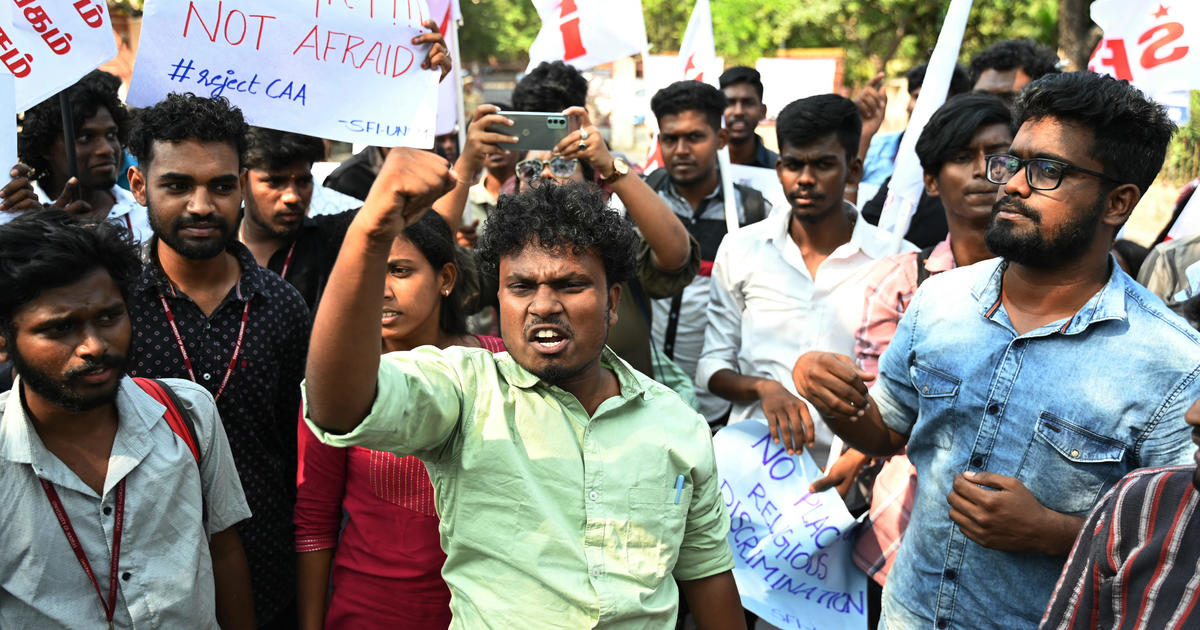CBS News
India implements controversial citizenship law singling out Muslims, drawing accusations of polarization

New Delhi — India’s government announced on Monday the implementation of hugely controversial citizenship law that singles out Muslims, four years after it was passed by parliamentarians, and just ahead of general elections in which Prime Minister Narendra Modi is hoping to win a third term. Opponents say the move by Modi and his party is “designed to polarize” India’s already divided population ahead of the voting, which takes place in April and May.
The Citizenship Amendment Act (CAA) paves the way for — specifically — non-Muslims who fled religious persecution in Afghanistan, Bangladesh and Pakistan and came to India before December 31, 2014, to become Indian citizens.
Muslims singled out by omission
India’s Home Minister said in a social media post on Monday that Prime Minister Narendra Modi had “delivered on another commitment and realized the promise of the makers of our constitution to the Hindus, Sikhs, Buddhists, Jains, Parsis and Christians living in those countries.”
The law does not provide a route to citizenship for people who’ve fled persecution in non-Muslim majority nations, such as Tamil refugees from Sri Lanka or Rohingya Muslim refugees from Myanmar, of whom there are many thousands in India.
R.SATISH BABU/AFP/Getty
Critics of the law say it violates the secular principles of India’s constitution, which prohibits discrimination against citizens on religious grounds.
The ministry said eligible people could apply from Monday for Indian citizenship through an online portal.
The NRC proposal, and proving citizenship
There’s fear that Modi’s Hindu nationalist government could use the CAA, along with another new measure, to declare Indian Muslims, many of whom are concentrated in eastern states like West Bengal and Assam, illegal immigrants from neighboring Bangladesh if they cannot prove their citizenship.
Many of India’s 200 million Muslims fear the citizenship law could be wielded in conjunction with a proposed new National Register of Citizens (NRC) to marginalize or even disown members of the world’s third largest Muslim population.
The NRC, which Modi’s government has vowed to roll out nationally, would require people to prove their citizenship by showing family documents going back decades. Those who aren’t able to produce the required evidence could face detention in camps, and then deportation.
About 1.9 million people failed the sudden nationality test when a state-level citizenship registry was rolled out in Assam in 2019, and several hundred were later placed in detention centers, where women have spoken of alleged abuse and inhuman conditions.
The national registry plan is based on the version already in place in Assam.
The CAA will enable many non-Muslims who fail to prove residency under the NRC to regain their citizenship, but it provides no such route to people of the Islamic faith.
“CAA has to be seen along with NRC, the Home Minister has made it very clear,” Professor Apoorvanand Jha, an Indian political academic and author, told CBS News. “The larger message to voters is, ‘we are going to exclude those who should be weeded out, that’s Muslims.'”
Modi’s government has denied the citizenship law is anti-Muslim and said it was needed to help religious minorities facing persecution in their Muslim-majority nations. It rejects the argument that the law could be used to take citizenship away from anyone.
Protests and accusations of deliberate polarization
Assam and Kerala states saw protests Monday and Tuesday after the federal government announced the implementation of the CAA. Police and paramilitary troops were deployed there, and in some Muslim-dominated areas of the capital Delhi, which was one of the epicenters of the 2019 protests against the measure.
Anuwar Hazarika/NurPhoto/Getty
More than 100 people were killed and thousands injured in clashes between anti-CAA protesters and police across India in 2019 — bringing international attention and, according to some observers, leading the government to hold back implementation of the law until now.
Opposition political parties called Monday’s announcement, just before the elections, a bid by Modi’s Bhartiya Janata Party (BJP) to polarize voters.
“After seeking nine extensions for the notification of the rules, the timing right before the elections is evidently designed to polarize the elections, especially in West Bengal and Assam,” Jairam Ramesh, a spokesperson for the opposition Congress party said.
“This is to divide the people, incite communal sentiments and undermine the fundamental principles of the Constitution,” Kerala Chief Minister Pinarayi Vijayan said in a statement. “This move to stratify Indian citizens who have equal rights, must be opposed unitedly.”
“They [BJP] did not succeed in getting public support despite promoting the temple inauguration for over a month… The only way they know is to polarize, and that is what they are doing,” social activist Shabnam Hashmi told CBS News.
The government has denied the allegations and said there had been “many misconceptions” about the law. It said implementation was delayed due to the coronavirus pandemic.
CBS News
How Biden is fighting calls to step aside

Watch CBS News
Be the first to know
Get browser notifications for breaking news, live events, and exclusive reporting.
CBS News
Houston mayor provides Beryl flooding update, says 2 million without power

Watch CBS News
Be the first to know
Get browser notifications for breaking news, live events, and exclusive reporting.
CBS News
4 signs credit card debt forgiveness may not work for you

nui/Getty Images
If you’re tired of making monthly credit card payments only to see minimal reductions in your balances then you may be looking into debt relief options. Credit card debt forgiveness is one to consider.
Debt forgiveness companies aim to help you save money and get out of debt faster through negotiations. If those negotiations are successful, your credit card companies may forgive a percentage of your balances, which could provide the relief you’re looking for.
But, like all debt relief options, credit card debt forgiveness isn’t a one-size-fits-all solution. So, what are some signs that credit card debt forgiveness may not work for you? That’s what we will detail below.
Let a debt relief expert help you put your credit card debt behind you now.
4 signs credit card debt forgiveness may not work for you
While credit card debt forgiveness programs are a good fit for some borrowers, they aren’t perfect for everyone. Here are a few signs that credit card debt forgiveness may not work for you:
You always make your payments on time
Credit card debt forgiveness is typically designed for borrowers who can’t consistently make minimum payments. So, if you make your credit card payments on time, every time, that may be a sign that these programs aren’t a good fit for you.
There are a wide range of debt relief options. And, credit card debt forgiveness is a more extreme option that can come with more significant repercussions than others. So, if you can afford to make your monthly payments on time – even if it’s not always comfortable – other debt relief solutions may be a better fit.
Find alternatives to credit card debt settlement here.
You don’t have enough credit card debt
Most credit card debt forgiveness companies require minimum debt amounts to qualify for their services. For example, you’ll need at least $10,000 in credit card debt to qualify for the services Accredited Debt Relief provides and Freedom Debt Relief and National Debt Relief both impose $7,500 minimums. If you have under $7,500 in credit card debt, you may be hard-pressed to find a service provider to work with.
You already have a judgment
If you forego payments to your credit card companies for too long, they may sue you for the money you owe. And, if your credit card companies sell your debt to a debt collector, that collector may take you to court, too.
If you lose the case, your credit card companies, or the debt collectors they’ve sold your debt to, may win judgments against you. Those judgments can give them leverage, making them less likely to negotiate what you owe. While you may be able to settle a debt following a judgment against you, doing so may be more difficult. So, if you already have one or more judgments against you and can’t afford to pay the debt back, bankruptcy may be a better option.
You’re considering a large purchase
Credit card debt forgiveness may not be your best debt relief option if you want to make a large purchase, like a home or car. That’s because these solutions can harm your credit score, making it difficult to access new loans.
“Asking for payment relief or debt forgiveness should be given serious consideration prior to taking action,” explains Michael Broughton, founder and CEO of the credit-building app, ALTRO. “Once you request a change to terms or a lower payment, your credit could be impacted and the chances that you will be able to get loans for other, unrelated items can be severely diminished.”
The bottom line
Credit card debt forgiveness is a fitting solution for many people – especially if they can’t afford their minimum payments. But, it’s not the best fit for everyone. You may want to consider other options if you always make your payments on time, don’t have enough credit card debt, already have judgments against you or you’re in the market for a large purchase. Chat with an expert about your debt relief options now.











